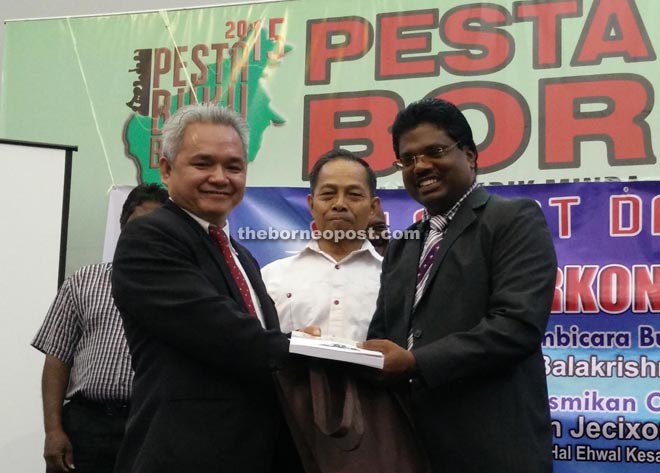
Balakrishnan (right) presenting his book as a memento to his former PhD student, Jecixon Muhamin who is Sabah Trade Unions director.
KOTA KINABALU: A strong collaboration between trade unions, employers and the government is paramount for entities, influencing workers’ fear to express any concerns, to determine the success of an organization and eventually, the country’s economic development.
However, Professor Dr Balakrishnan Parasuraman said the current absence of a dialogue, especially from the employees’ side, cast a spectre of doubt on the Malaysia’s journey of becoming a developed nation by 2020.
“I believe the 1Malaysia concept of ‘People First, Performance Now’ is only in terms of theory, but not in practice. What do you mean by “People First”?” Dr Balakrishnan asked at his knowledge sharing public talk on topics related to his book “Employee Participation in Malaysia: Theory and Practices” during the Borneo Book Fair 2015 here yesterday.
According to Dr Balakrishnan, putting people first would mean discussions between employees, trade union and management towards obtaining a balanced and successful outcome, such as the formation of a minimum wage policy.
“Minimum wage was actually enacted through good partnerships between union, employers and the government. I am one of the technical committee, I am one of the pioneers to come out with this policy. I can tell you, frankly speaking, the government doesn’t interrupt in the making of the policy,” revealed Dr Balakrishnan, whose book was also officially launched in Sabah during the event.
“In fact, PM (Prime Minister Datuk Seri Najib Razak) appointed independent parties, including the academics,” he said, adding that Najib was also responsible for raising the announced RM800 and RM900 minimum wage,” he elaborated.
“Today our Malaysia … Asian context, we all never participate. We are just involved and we are very scared, you know. Asians are very scared to give ideas. We are going to be a developed nation very soon, by year 2020? Do you think our employees are like that? That’s why they go to Facebook and then they announce things there. This is not good actually,” he added.
Today, any policies formed or changes made in the company should be discussed with the employees. Regardless of whether a union has been set up or not within an organization some kind of cooperation should take place, he stressed.
“Looking at Sabah. I was there for almost 20 years. I did a lot of research, I think we need to do a lot of things in Sabah because many of our youths are unemployed,” he said.
“That’s one reason we bring the minimum wage, to actually attract people to go to the labour market. But very sad, the wage that we are paying them is actually going to the foreign workers and foreign workers are enjoying the salary.
“It is okay, foreign workers, they are coming to work, they are not coming to disturb us. They are actually contributing. But why are our locals, especially Sabah or Sarawak or even Semenanjung Malaysia, doesn’t go to that work force?” he asked.
Dr Balakrishnan’s book, published by Universiti Malaysia Kelantan, is part of his doctoral thesis at the University of Wollongong in Australia, which basically depicts of the role of employers, trade unions and employees in the decision making process.
Through his research and empirical data work that involves three case studies, he found that the sole case involving a company without the existence of a union had closed down after the 1997 to 2000 economic crisis.
“About 200 people lost their job at that particular time. This is a company in the auto industry. They lost their jobs, I don’t know what happened to them. That company makes us very proud because we are making cars,” he lamented.
“The other two cases involve a company in the steel industry in West Malaysia and the other one is Pos Malaysia. These two companies, they don’t lay off people but work as a team. They are working flexible hours, meaning to say, they are working with a union that supports them and where the employees are safe,” he explained.
The book was similarly launched by Sarawak Chief Minister Tan Sri Datuk Patinggi Adenan Satem in Kuching, where some 100 books were ordered as a result, said Dr Balakrishnan.
He added that the book, which is being used by corporate leaders in government agencies, should be adapted for students and practitioners alike.
Dr Balakrishnan, who originally hails from Kedah, started his career as a teacher in SMK Abdullah, Semporna before becoming part of the pioneering batch in University Malaysia Sabah (UMS). He spent 18 years in UMS, established an Industrial Relations program and was promoted to Associate Professor there.
He was later invited to be a professor at Universiti Malaysia Kelantan to help out the university, and is currently the professor of Industrial Relations and Human Resource Management in the Faculty of Entrepreneurship and Business.
Dr. Balakrishnan is currently working with the Sabah government and the Human Resource Ministry.
